|
|
| Sei in: Cinema e Medioevo ® Indice alfabetico dei film |
RICCARDO III
(Richard III)
1955, regia di Laurence Olivier
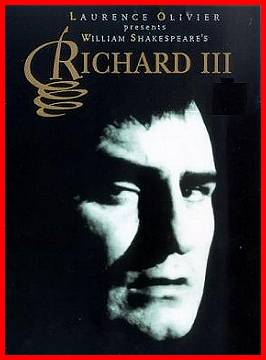
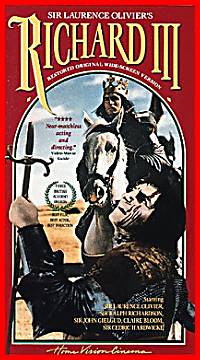
Scheda: Nazione: GB - Produzione: London Film Productions - Distribuzione: Cineriz Panarecord, Tecnedit, London Films International, Criterion Collection, Lopert Pictures Corporation - Soggetto: dall'omonima tragedia di William Shakespeare - Sceneggiatura: Colley Cibber, Alan Dent, Laurence Olivier, David Garrick - Fotografia: Otto Heller - Montaggio: Helga Cranston - Art Direction: Carmen Dillon - Costumi: H. Nathan, L. Nathan - Musiche: William Walton - Effetti speciali: Wally Veevers - Formato: Vistavision Technicolor - Durata: 161' (140').
Cast: Laurence Olivier, Cedric Hardwicke, Nicholas Hannen,
Ralph Richardson, John Gielgud, Mary Kerridge, Pamela Brown, Paul Huson, Stewart Allen, Claire Bloom, Russell Thorndike, Wally Bascoe, Norman Fisher, Andrew Cruickshank, Clive Morton, Terence Greenidge, Norman Wooland, Alec Clunes, Dan Cunningham, Douglas Wilmer, Laurence Naismith, Helen Haye, Roy Russell, George Woodbridge, Esmond Knight, John Laurie, Richard Bennett, Stanley Baker.
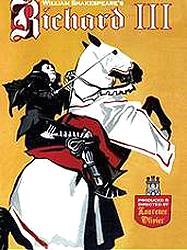
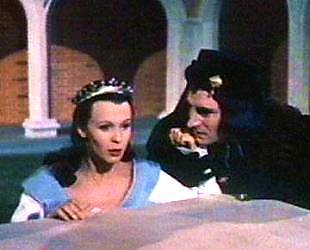
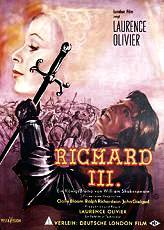
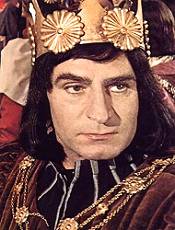
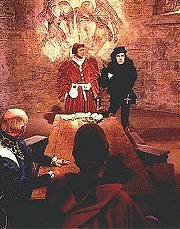
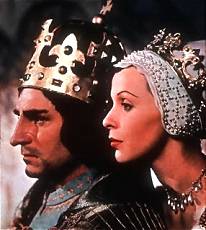
![]() Trama e commenti: cinematografo.it
-
mymovies.it
- film.spettacolo.virgilio.it
- cinema-locandine.it
- kataweb.it
- cinekolossal.com: «Riccardo, deforme dalla nascita, pur di arrivare al potere, elimina in rapida successione fratello, due nipoti, il duca di Bukingam e il Principe di Galles. Salito al trono affonda in battaglia a Bosworth il conte di Richmond ed è sconfitto.
è il film che chiude la trilogia shakesperiana di Laurence Olivier, iniziata con
Enrico V e proseguita con
Amleto. Il meno fluorescente dei tre; sobrio nelle scenografie, ineccepibile nelle forme, seppur la sceneggiatura, completamente adattata, semplifica di molto il testo originale, eliminando diversi personaggi chiave (la regina Margherita) con l'intento, riuscito, di ridurre il monarca a vero eroe del Male. Quindi, un Riccardo III a misura d'uomo, che Olivier trasforma da deforme, tirannico e assetato di potere in un povero re rimasto solo; lui, il trono tanto bramato, la sua corona insanguinata, le sue frasi ad effetto: "Un cavallo per il mio regno" e "Posso cambiare colore come un camaleonte". Inizialmente affidato alla regia di Carol Reed che rifiutò l'incarico per precedenti impegni, ma che ugualmente mise del suo, attraverso suggerimenti di carattere personale che poco andarono a genio a Laurence Olivier, come la presenza del personaggio Jane Shore, assente nel testo, interpretato da Pamela Brown, e che il regista infine accettò ma relegò ai margini facendogli apostrofare solo 4 parole in tutto il film. Tra le ultime grandi produzioni di Alexander Korda per la mitica London Films. Rifatto nel
1995 (ambientato nell'Inghilterra degli anni '30) e nel 1996,
Riccardo II - Un uomo, un
re, diretto e interpretato da Al Pacino in una versione modernista e di taglio semi-documentario».
Trama e commenti: cinematografo.it
-
mymovies.it
- film.spettacolo.virgilio.it
- cinema-locandine.it
- kataweb.it
- cinekolossal.com: «Riccardo, deforme dalla nascita, pur di arrivare al potere, elimina in rapida successione fratello, due nipoti, il duca di Bukingam e il Principe di Galles. Salito al trono affonda in battaglia a Bosworth il conte di Richmond ed è sconfitto.
è il film che chiude la trilogia shakesperiana di Laurence Olivier, iniziata con
Enrico V e proseguita con
Amleto. Il meno fluorescente dei tre; sobrio nelle scenografie, ineccepibile nelle forme, seppur la sceneggiatura, completamente adattata, semplifica di molto il testo originale, eliminando diversi personaggi chiave (la regina Margherita) con l'intento, riuscito, di ridurre il monarca a vero eroe del Male. Quindi, un Riccardo III a misura d'uomo, che Olivier trasforma da deforme, tirannico e assetato di potere in un povero re rimasto solo; lui, il trono tanto bramato, la sua corona insanguinata, le sue frasi ad effetto: "Un cavallo per il mio regno" e "Posso cambiare colore come un camaleonte". Inizialmente affidato alla regia di Carol Reed che rifiutò l'incarico per precedenti impegni, ma che ugualmente mise del suo, attraverso suggerimenti di carattere personale che poco andarono a genio a Laurence Olivier, come la presenza del personaggio Jane Shore, assente nel testo, interpretato da Pamela Brown, e che il regista infine accettò ma relegò ai margini facendogli apostrofare solo 4 parole in tutto il film. Tra le ultime grandi produzioni di Alexander Korda per la mitica London Films. Rifatto nel
1995 (ambientato nell'Inghilterra degli anni '30) e nel 1996,
Riccardo II - Un uomo, un
re, diretto e interpretato da Al Pacino in una versione modernista e di taglio semi-documentario».
![]() Plot Summary, Synopsis, Review: IMDb
-
entertainment.msn.com
- tvguide.com
- criterionco.com
- rottentomatoes.com
- dvdtalk.com:
«With King Edward IV (Cedric Hardwicke) near death, Richard the Duke of Gloucester (Laurence Olivier) puts his plan into effect - to divide the royals, snuff out the proper heirs and get himself crowned
King. ... English majors and theater fans probably need read no further, as any of them are going to know a lot more about Richard III than this reviewer. Everything about this picture is impressive. Even the critics called it Laurence Olivier's best job of adaptation and direction. His black-hearted villain ranks up with the nastiest ever, and he's surrounded with talent equal to his own - Richardson, Gielgud, Claire Bloom. Coming at the movie from the position of someone unschooled in Shakespeare, the poetry of the play is fascinating in itself. Like watching a fine ballet, there's a keen awareness that finer points of art, acting and theatrical history are there to be
discovered...».
Plot Summary, Synopsis, Review: IMDb
-
entertainment.msn.com
- tvguide.com
- criterionco.com
- rottentomatoes.com
- dvdtalk.com:
«With King Edward IV (Cedric Hardwicke) near death, Richard the Duke of Gloucester (Laurence Olivier) puts his plan into effect - to divide the royals, snuff out the proper heirs and get himself crowned
King. ... English majors and theater fans probably need read no further, as any of them are going to know a lot more about Richard III than this reviewer. Everything about this picture is impressive. Even the critics called it Laurence Olivier's best job of adaptation and direction. His black-hearted villain ranks up with the nastiest ever, and he's surrounded with talent equal to his own - Richardson, Gielgud, Claire Bloom. Coming at the movie from the position of someone unschooled in Shakespeare, the poetry of the play is fascinating in itself. Like watching a fine ballet, there's a keen awareness that finer points of art, acting and theatrical history are there to be
discovered...».
![]() Approfondimenti: Movie
Review
Approfondimenti: Movie
Review